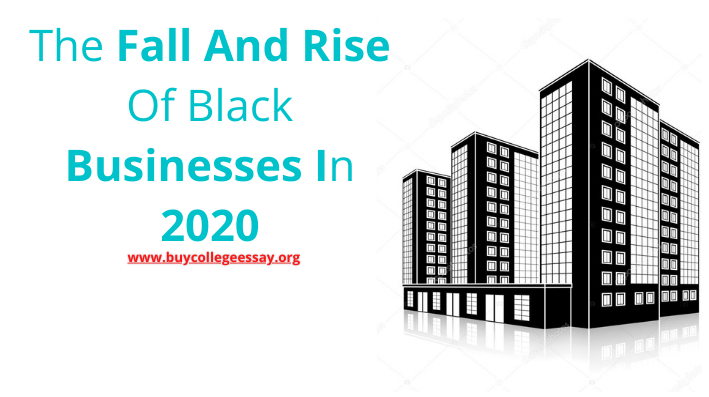For black cultures, social distancing is not new. Racial distancing” was U.S. law throughout the 19th and 20th centuries in the implementation of non prejudice and racism.” This generated inequalities in ethnic wealth that have continued, adversely affecting the potential of black people to launch and retain corporations. The remains of federally sponsored redlining policies, which during the 20th century financially segregated black people, reduced the amount of income that black people could generate from homeownership. To know the reason behind fall and rise in Business Essay Help. Many founders launch companies with the equity in their homes that they have accumulated.
Not only black business there was a huge fall in other businesses also during the pandemic. In this article you are going to see what exactly happens to black business.
Fall and rise of black businesses
The kit of the Coronavirus Aid, Relief, and Economic Stability Act (Cares) is an effort to prepare for an inevitable depression triggered by compulsory and voluntary social distancing that will continue until 30 April at least. Congress should also enact a relief programme for persons who have benefited from the de jure and de facto social distancing of racial discrimination, which still separates African Americans on both a geographical and economic level from white people today.
The official music of D.C. has lately been called Go-Go, but the honour has not come with financial help for the constellation of black businesses that help the ethos of Go-Go. In the meantime, in D.C. there is a cluster of arts nonprofits. Despite the reality that they currently pull in more than $1 million in sales annually, they earn grants from the District. Black salons and beauty salons are grappling with structures that enabled black communities for decades to endure discrimination and legal exclusion. Where’s their bailout there?
We support funding for the arts, despite difficult times. Yet we need to make taxpayer dollars reach as long as possible in emergencies. If a bailout can be secured by well-endowed organisations such as the Kennedy Center, then we think it is more than fitting to develop set-aside programmes explicitly for black institutions and corporations that have survived a history of legal segregation.
Congress allotted 350 billion dollars to the Small Business Administration through the Cares Act to grant loans of up to 10 million dollars per corporation. Moreover, to offset running costs, the Cares Act includes $10 billion for disaster grants of up to $10,000 for small companies. If the firms retain workers on the payroll through June, these loans became grants.
Yet we need to remember the systemic challenges that also hinder the involvement of black companies in these stimulus measures. According to analysis taken from the new Census Survey of Business Owners, Black people accounted for 12.7 percent of the United state population, but just 4.3 percent of the 22.2 million business owners in the country in 2012. Asian Americans accounted for 6.9 per cent of business owners and 4.8 per cent of the population, while 12 percent of business owners and 16.4 percent of the population were Latino or Hispanic Americans. Meanwhile, according to Brookings and Gallup studies, only 1 percent of black company owners were able to secure loans in their starting year, compared with 7 percent of white entrepreneurs.
Despite necessity, Congress distributed only $10 million out of the $2.2 trillion coronavirus treatment bill to the Minority Business Development Organization (MBDA). The MBDA ties minority-owned companies with the money, contracts, and markets that they need to expand, but not even 1% of coronavirus relief assistance has been obtained.
Our market devaluation analysis finds that in large percentage communities, minority-owned companies (i.e. black people, American Indians, Asian Americans, Latinos or Hispanics) gain substantially higher scores on the Yelp customer review app than white-owned peers in white neighbourhoods, but they receive less revenue due to the unfavourable view of the black neighbourhoods they are in.
Read more – Guest Post Outreach services
The Covid-19 pandemic has demonstrated that we have a moral obligation focused on social justice to share money. Then all people are better off because the most disadvantaged communities are well. The new coronavirus reveals how we are all intertwined as the infection infects individuals through race, class, religion, gender, and age. Privilege may blind some to the fact that we are all truly linked, Business Dissertation Help, but elected officials can no longer hide their heads in the sand in reaction to the particular insecurity of black-owned businesses and communities.
Final words
Not only black business there was a huge loss to other businesses also but after some time there was a rise in business especially black business. COVID-19 has affected almost every business. I hope information given above is enough for you to understand about black business and the fall and rise of black business.
Check also:- fmovies cab










